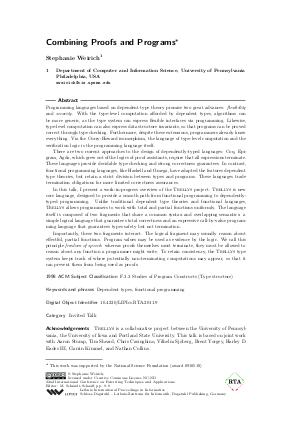Combining Proofs and Programs
Author Stephanie Weirich
-
Part of:
Volume:
22nd International Conference on Rewriting Techniques and Applications (RTA'11) (RTA 2011)
Part of: Series: Leibniz International Proceedings in Informatics (LIPIcs)
Part of: Conference: International Conference on Rewriting Techniques and Applications (RTA) - License:
 Creative Commons Attribution-NonCommercial-NoDerivs 3.0 Unported license
Creative Commons Attribution-NonCommercial-NoDerivs 3.0 Unported license
- Publication Date: 2011-04-26
File

PDF
LIPIcs.RTA.2011.9.pdf
- Filesize: 265 kB
- 2 pages
Document Identifiers
Subject Classification
Keywords
- Dependent types
- functional programming
Metrics
- Access Statistics
-
Total Accesses (updated on a weekly basis)
0Document
0Metadata
Abstract
Programming languages based on dependent type theory promise two great advances: flexibility and security. With the type-level computation afforded by dependent types, algorithms can be more generic, as the type system can express flexible interfaces via programming. Likewise, type-level computation can also express data structure invariants, so that programs can be proved correct through type checking. Furthermore, despite these extensions, programmers already know everything. Via the Curry-Howard isomorphism, the language of type-level computation and the verification logic is the programming language itself. There are two current approaches to the design of dependently-typed languages: Coq, Epigram, Agda, which grew out of the logics of proof assistants, require that all expressions terminate. These languages provide decidable type checking and strong correctness guarantees. In contrast, functional programming languages, like Haskell and Omega, have adapted the features dependent type theories, but retain a strict division between types and programs. These languages trade termination obligations for more limited correctness assurances. In this talk, I present a work-in-progress overview of the Trellys project. Trellys is new core language, designed to provide a smooth path from functional programming to dependently-typed programming. Unlike traditional dependent type theories and functional languages, Trellys allows programmers to work with total and partial functions uniformly. The language itself is composed of two fragments that share a common syntax and overlapping semantics: a simple logical language that guarantees total correctness and an expressive call-by-value programming language that guarantees types safety but not termination. Importantly, these two fragments interact. The logical fragment may soundly reason about effectful, partial functions. Program values may be used as evidence by the logic. We call this principle freedom of speech: whereas proofs themselves must terminate, they must be allowed to reason about any function a programmer might write. To retain consistency, the Trellys type system keeps track of where potentially non-terminating computations may appear, so that it can prevent them from being used as proofs.
Cite As Get BibTex
Stephanie Weirich. Combining Proofs and Programs. In 22nd International Conference on Rewriting Techniques and Applications (RTA'11). Leibniz International Proceedings in Informatics (LIPIcs), Volume 10, p. 9, Schloss Dagstuhl – Leibniz-Zentrum für Informatik (2011)
https://doi.org/10.4230/LIPIcs.RTA.2011.9
BibTex
@InProceedings{weirich:LIPIcs.RTA.2011.9,
author = {Weirich, Stephanie},
title = {{Combining Proofs and Programs}},
booktitle = {22nd International Conference on Rewriting Techniques and Applications (RTA'11)},
pages = {9--9},
series = {Leibniz International Proceedings in Informatics (LIPIcs)},
ISBN = {978-3-939897-30-9},
ISSN = {1868-8969},
year = {2011},
volume = {10},
editor = {Schmidt-Schauss, Manfred},
publisher = {Schloss Dagstuhl -- Leibniz-Zentrum f{\"u}r Informatik},
address = {Dagstuhl, Germany},
URL = {https://drops.dagstuhl.de/entities/document/10.4230/LIPIcs.RTA.2011.9},
URN = {urn:nbn:de:0030-drops-31398},
doi = {10.4230/LIPIcs.RTA.2011.9},
annote = {Keywords: Dependent types, functional programming}
}
